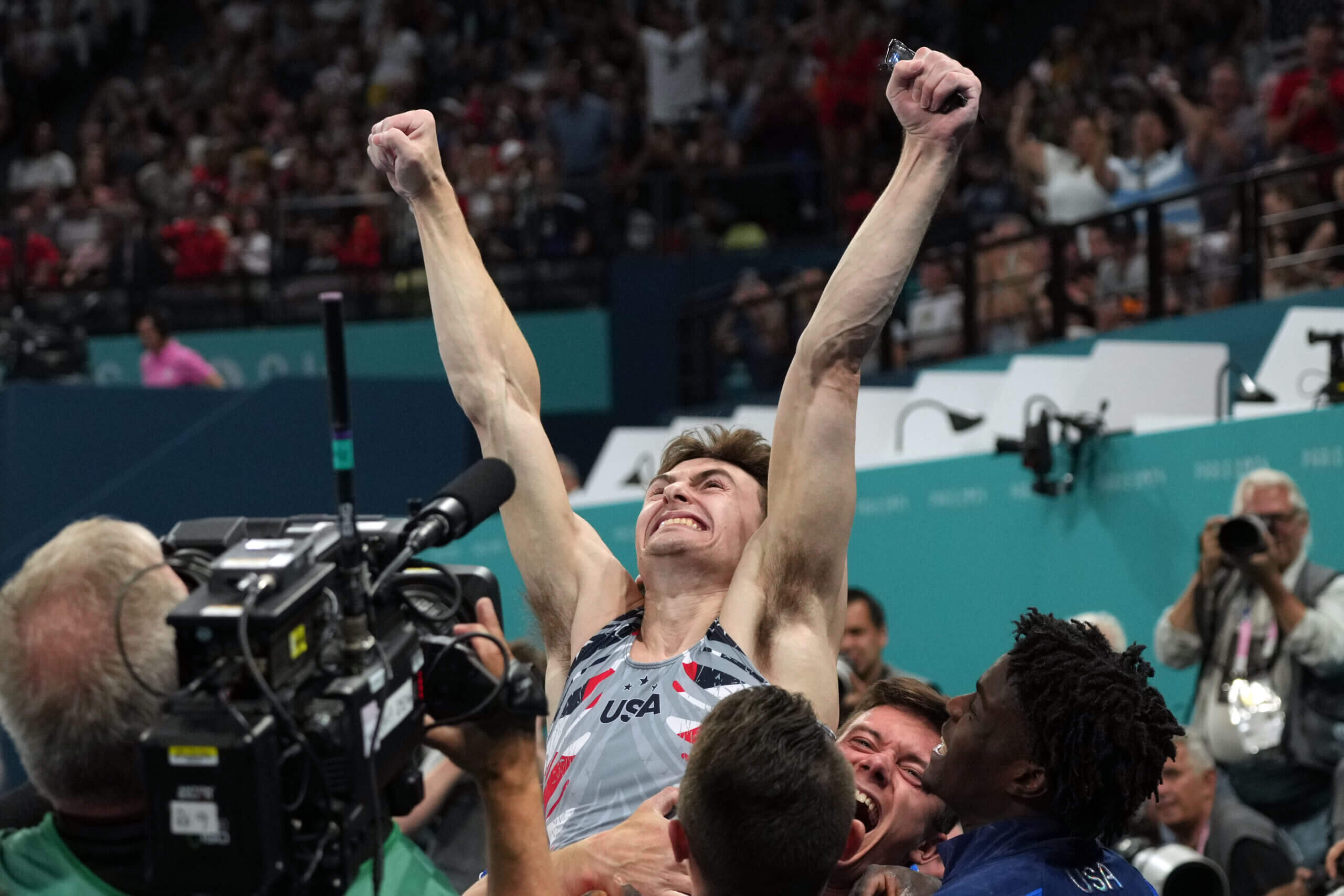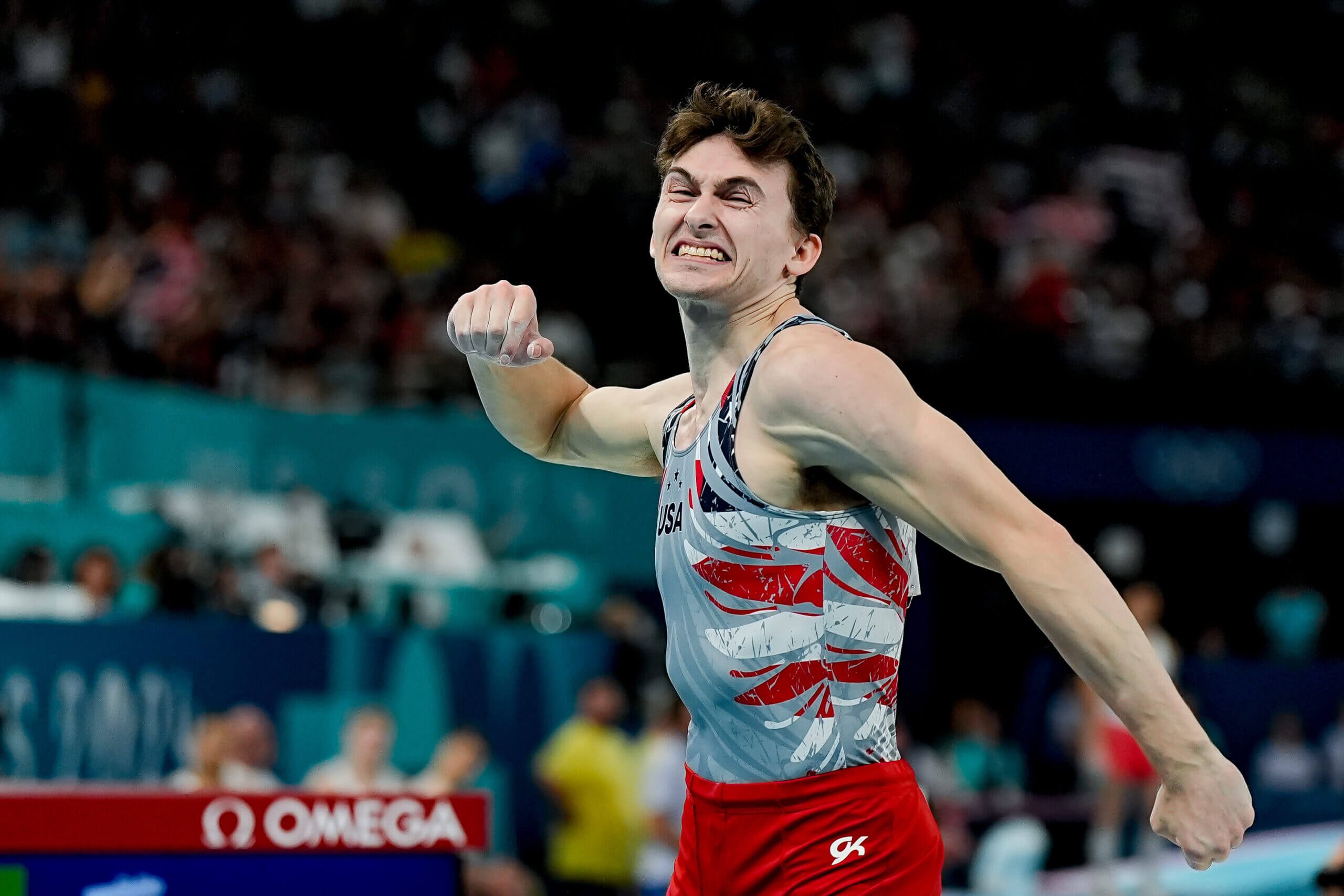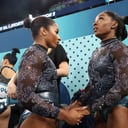
PARIS — Somewhere after his dismount from the pommel horse and the celebration with his teammates, Stephen Nedoroscik did what he always does after competing: He grabbed for his glasses. In the span of one Olympic moment, those specs have become something of an internet sensation. They are not, however, some prop a la Miranda Priestly in “The Devil Wears Prada,” tossed on and off for effect; Nedoroscik has a disease that renders his eyes permanently dilated.
“But I don’t need to see when I do pommel horse,” Nedoroscik said, a bronze medal draped around his neck and a grin spread across his face. “It’s all by feel.”
Nedoroscik felt his way through a two-minute set and into Olympic lore. A pommel horse specialist in Paris to do one thing exceptionally well, he was the last man to compete in Monday’s men’s gymnastics team final. His team in contention but not yet assured of its first medal of any kind in 16 years, Nedoroscik discarded his glasses, walked up to the horse and started swinging.
STEPHEN. NEDOROSCIK.
The routine that clinched @USAGym‘s first Olympic medal in the men’s team final since 2008 🥉
📺: @NBCOlympics & @peacock#ParisOlympics pic.twitter.com/NiDVBvxx12
— Team USA (@TeamUSA) July 29, 2024
The result: a 14.866 score that secured bronze for Team USA, its first team medal in gymnastics since 2008.
Thousands of miles and an ocean away, Randy Jepson watched and knew Nedoroscik was going to clinch the medal. Some eight years ago, Nedoroscik sent him the equivalent of a cold call, emailing the Penn State gymnastics coach a video of him from high school. Though a junior Olympic champion, Nedoroscik didn’t have a single college offer. His singularity of gymnastics purpose understandably made him less appealing in a sport in which few schools sponsor the sport and there are even fewer scholarships to offer. But Penn State and Jepson long have liked their pommel horse specialists; the school has produced 12 national champions in the event. He was intrigued, but Nedoroscik hadn’t been to campus — or at least Jepson didn’t think he had.
Then one day, scrolling through social media, the coach spied a picture on Nedoroscik’s feed of some very familiar squirrels hanging around a very familiar spot.
“It was Penn State squirrels in the Penn State parking garage,” Jepson said with a laugh. Nedoroscik had come to State College to check out Penn State and its facilities but never told Jepson he was coming. Eventually, Jepson learned that was part of Nedoroscik’s quirky charm.
He is a delightful analytical nerd, an electrical engineering major who enjoys solving (not attempting, but solving) a Rubik’s Cube in his spare time. He gets ticked if it takes over 10 seconds. Yet he’s also hilariously goofy, quick to poke fun at himself and the best sort of teammate. Accustomed to waiting around to do his thing, Nedoroscik pours his spare time and all of his energy into cheering on his teammates.
He did it at Penn State, where he eventually won two national titles, and he does it now, on the senior circuit. As Team USA made its way around the other five rotations in the team final, Nedoroscik could be found in full warmups, cupping his hands over his mouth and barking cheers to his teammates.
“It’s not easy being a specialist,” Jepson said. “You have to wait around, and there’s a lot of pressure to perform. But Stephen is such a joy to be around. He’s an amazing, amazing teammate.”
He also is exceptionally good at the one thing he does, though his path here has been bumpy. His last collegiate season was canceled by COVID, and his first shot at an Olympic berth ended disastrously. He fell on the first day of competition at trials, finishing third and failing to make the team. He rebounded after Tokyo to win the 2021 world championship in pommel horse, but 2022 and 2023 were pockmarked with as many lows as highs.
The analyst in Nedoroscik considered his circumstances, realizing he was more hell-bent on winning than simply doing his routine. That wasn’t how Jepson taught him to do things.
“One thing at a time, that’s it,” Jepson said. So Nedoroscik went back to his roots, worrying only about finishing his first Russian flop, an incredibly difficult skill but the first in his routine. From there he went to the second and so forth, solving the pommel horse with the same diligence he took to the Rubik’s Cube.

Stephen Nedoroscik was the very last person to compete Monday for Team USA. And it was worth the wait for the Americans. (Daniela Porcelli / Eurasia Sport Images / Getty Images)
The result is a man who manages to stay calm in the face of inordinate pressure. What Nedoroscik had to go through during the team final is not nice. The luck of the draw — bad in this case — put the U.S. on the rings to start, which means, as you roll around the competition floor in a counterclockwise direction, pommel horse would be last. The lineups are stacked, as well. Three athletes compete on each apparatus, and all three scores count. They go worst to best, which means Nedoroscik would be the last man on the last apparatus for the U.S.
The men’s team does not score-watch. When the public address announcers share the standings after each rotation, Frederick Richard and Nedoroscik cover their ears and yell, “La la la la,” to block out the information. But the crowd tells you what you don’t want to know, and so do the routines. The United States hit one routine after another — eventually going a perfect 18 for 18 — and the noise in a very heavily pro-U.S. crowd picked up like a steady crescendo. Chants of “U-S-A” filled Bercy Arena, and even if you didn’t know what exactly was going on, it was impossible to not know what was actually going on.
By the time they rolled around to the last rotation, they were poised to medal. But they had to hit the routines to ensure it. Paul Juda nailed his, as did Brody Malone, and then came Nedoroscik. The morning of the competition, he posted a video of a solved Rubik’s Cube on his Instagram. Done in 9.321 seconds.
“Good omen,” he wrote.
Back in State College, Jepson saw the video and thought the same. Then he sat down in his house, flipped on the TV and watched Nedoroscik begin to swing.
“He did that first Russian flop, and I said, ‘Oh, he’s got this,” Jepson said. “He absolutely has this.”
Nedoroscik kept swinging, dismounted, and grabbed his glasses. He could see clearly, all the way to the bronze medal that eventually hung around his neck.

GO DEEPER
Jordan Chiles had a huge day, then came the cruel reality of Olympic gymnastics
(Top photo of Stephen Nedoroscik celebrating his pommel horse routine Monday in Paris: James Long / USA Today)